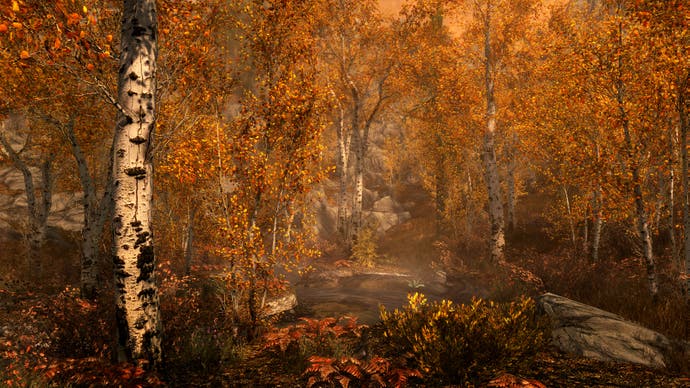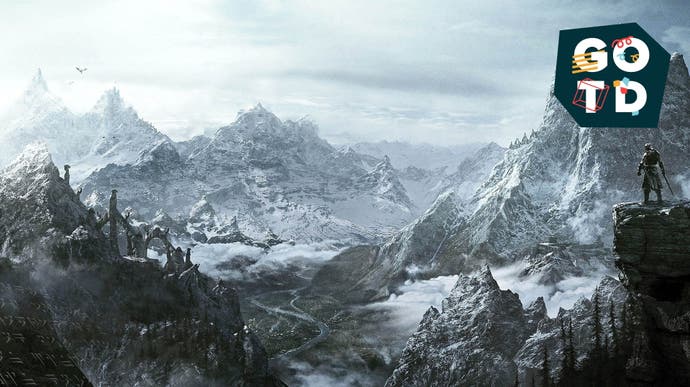Games of the Decade: The Elder Scrolls 5: Skyrim is anything but overrated
V. good.
To mark the end of the 2010s, we're celebrating 30 games that defined the last 10 years. You can find all the articles as they're published in the Games of the Decade archive, and read about our thinking about it in an editor's blog.
It's hard to think of a game that's been subject to just as much revisionism as Skyrim. Maybe that's to be expected, given its dizzying success. The game is everywhere and its cultural reach is almost insurmountable - so much so that the jokes about climbing mountains, taking arrows and porting to toasters have all been unfashionably irksome for much longer than they were ever funny in the first place. And with all that success comes the inevitable and insufferable "not that good actually" crowd.
But they are wrong! Skyrim is good, actually. Exactly as good as everyone says it is. And it is good for a lot of reasons but none of them as truly special, I think, as its world - or rather, more specifically, the ineffable rules that bind it. There is an intangible realism to Skyrim's world that I haven't really felt in a game of its budget and scope since. It's in the mechanics of it - the literal mechanics; the basic billiard balls of the physics - and the best example I can think of, for some reason, is pushing people off a ledge.

Push someone off a ledge in a big-budget, big-sized, post-Skyrim open world game and watch what happens. Animations. They will stagger a bit, and then they'll sort of shimmy themselves past the edge of the ledge itself, and then they'll start a ready-made, very nicely animated falling manoeuvre - designed for precisely this moment, to maintain the realism and the immersion and all that - and then they will fall.
In Skyrim, they will just fall. It might seem sort of backwards, in comparison to those other games, because the conjoining movements that us humanoids naturally make when we fall off things aren't all there, but the simple falling of Skyrim does something for me that the canned stumbles of far more modern and technically accomplished games don't. It makes sense - and it makes sense at every step of the way. Skyrim's physics are clumsy and uncouth, but they're consistently so. They're consistent internally: this is how things fall off ledges in Skyrim, always. This is how A reacts to B when you hit it in a certain way.
When you throw in the more advanced, transitional little animations, what you get is that classic dip into the uncanny, where that guard or grunt might look a bit more like someone actually falling, in how they wave their arms and stick out a leg and try, for a floating second, to regain balance - but with all those bells and whistles attached it then only takes just a flicker of video game clunk to throw it monstrously off. If that grunt's foot is just a hair's breadth past the edge of that wall or mountain or rooftop when they start their canned arm-waggling animation then that connection between you and the world - the sort of psychic bond you form between actions and consequences, billiard ball A and billiard ball B - is broken.
What I'm getting at, beyond the scope of just how things fall off of other things, is that there is something infinitely more real about things reacting in a way you can predict and expect, even if that's different to how they do in the "real" world, than there is in things trying to directly imitate the real world but ever so slightly missing it. And the result of The Elder Scrolls' particularly unique, clunky physics is that Skyrim's connection between you and its world, unlike its peers and its imitators, is near indestructible. When I play Skyrim I am in it, like I'm in no other game of its kind. Instead of trying to play how the game wants me to play, within the confines of its invisible walls or closed doors or uncanny animations, I am off the rails. Free. Free to really, truly play.


